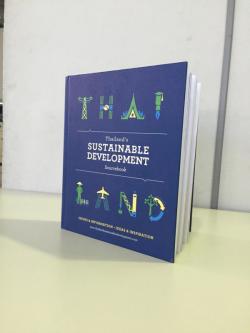In-depth information sourced by experts, attractive infographics and accessible English are just a couple of reasons why Thailand's Sustainable Development Sourcebook should reach the wider public, said Dr Chirayu Isarangkun Na Ayuthaya, chairman of the Thailand Sustainable Development Institute.
Dr Chirayu was a special adviser in the production of this substantial book, which took 18 months to complete. Over 70 experts from various fields contributed to the writing of subjects ranging from income equality to education, from community participation to poverty eradication -- all under the theme of long-term sustainability of society. Experts in sustainable development Dr Harald Bergsteiner and Dr Gayle Avery also offered their support on this project. Dr Avery and Dr Bergsteiner are, in fact, working on their own book about the Sufficiency Economy Philosophy.
Thailand's Sustainable Development Sourcebook had its launch last week. It was published by Editions Didier Millet (EDM).
Dr Chirayu, who is also director-general of the Crown Property Bureau, has continued to champion the principle through his work with not just at the Thailand Sustainable Development Institute, but also through the Thailand Sustainable Development Foundation (TSDF) which he is an active part of.
The book has come out at an auspicious time, since Thailand will be celebrating 70 years of HM King Bhumibol Adulyadej's reign next year. The book is also being released to coincide with this year's launch of the United Nations' 2030 Agenda for Sustainable Development, said Dr Chirayu.
"The global milestones will surely boost Thailand's efforts to apply the principles of Sufficiency Economy philosophy of HM the King to the sustainable development efforts in Thailand," remarked Dr Chirayu.
"This book should benefit anyone who is looking for comprehensive and up-to-date information on sustainable development in Thailand in English. The compilation covers 62 thoroughly researched stories on Thailand's major sustainable development programmes that are written and reviewed by experts, and I appreciate the fact that it deals with the backgrounds to some of the country's most intractable topics, obstacles and how to overcome them, in addition to how His Majesty's Sufficiency Economy guidelines and royal projects have helped with sustainable development."
At 416 pages, Thailand's Sustainable Development Sourcebook lays down the fundamental concept of sustainable development, and explores multiple aspects of Thailand's attempts to apply it, complete with graphs, statistics and figures that serve as a framework. This ranges in subjects from energy to biodiversity, from economic competitiveness to tourism.
Dr Chirayu said the chapter on the introduction to sustainable development was probably one of his favourites because it is a good account of how it developed through the decades. It really developed over a period of maybe three or four decades, he said, so readers can see when it first started and how it developed in an easy-to-follow format.
He adds that while this coffee table book covers an array of hard-hitting topics worthy of policymakers, it is clear from the start that it should be read by second year university students to adults, so the English was kept simple. With as many as 100 case studies, he said the book speaks to people of all walks of life and how they can use sustainability, whether in the home or at office. Accessible information is documented through over 120 infographics.
"Books are not meant to be a bitter pill that you rebel against, so that is why Thailand's Sustainable Development Sourcebook is reader-friendly in all aspects. A book is good when the readers are attracted to it," he said.
The chapter on social issues was also of particular interest to Dr Avery, a consultant on the project: "Social issues are key to social development, taking people out of poverty, giving them clean water, enough to eat and more. What is the point of sustainable development if it isn't for the betterment of people? So I would say it is exceptionally critical to have social problems addressed in the book.
"The bit I liked in the book is about Thai culture and history. It makes the jigsaw understandable to foreigners. At world level there are only three dimensions: economics, social and environmental and culture. With culture, you can get the whole picture."
Dr Avery also found the book to be clever in that it addresses a number of subjects. There are different dimensions to it, she noted, so for a person who wants a quick overview of facts and figures of Thailand, there are snippets and graphics, while someone intending to study or to do business in Thailand that is also a quick information grab.
"For someone like me who doesn't fully understand Thai culture, that is there as well. And I do think for sustainable development, for people to really understand the problem of Thailand is important. Also there is a lovely double spread on the Sufficiency Economy philosophy of His Majesty, which I feel is part of cultural Thai society that really needs to be better publicised and understood in the West."
On whether there wasn't enough books already on sustainability, Bergsteiner said: "In fact, there is not as much written on sustainability as people might think. Most of the literature we find is actually on the opposite. The non-sustainable sector is bigger than the sustainable one. So we need more literature on the topic, we are not overburdening society with it."




